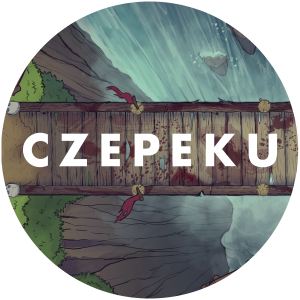Jesse Criss

Introduction
I think I would make a great ENNIES judge because I have a passion for learning more about TTRPGs as a whole. I was introduced to this world during COVID, and I have been obsessed ever since. I spend a lot of my time online looking up new games on itch.io, following Kickstarters, and hunting deals and new mechanics to try on DriveThruRPG. I think this makes me a good judge because I come with fresh eyes. I don’t have a system bias, I’m open to new ideas, and I’m hungry to learn more about the big, open world that is tabletop roleplaying.
Why do you play/run RPGs?
I started playing Fabled Lands as a way to stretch my imagination and creativity during COVID. That turned into a five-year journey to see what’s out there, but what drives my play and my continued search for the best books, mechanics, systems, and resources is a desire to be creative. I think creativity and imagination are muscles that need to be strengthened and developed, and TTRPGs have been a way that I have stretched and grown myself over these last five years.
The ENNIES requires a major commitment of time and energy. What resources do you have that will help you discharge these responsibilities? Will your gaming group or other individuals be assisting you? Does your family support you?
I think my biggest resource is time. I have it and a fair bit of flexibility for meetings and conversations. I already spend a ton of time looking up new things, so this would help focus that energy. I also work with deadlines, on teams, and manage different opinions in my daily job, so bringing those skills to the table will be natural.
Judging requires a great deal of critical thinking skills, communication with other judges, deadline management, organization, and storage space for the product received. What interests, experience, and skills do you bring that will make you a more effective judge?
I am a systems person who likes to figure out how things work, so for this, I’ll probably create a system to help me stay on top of things. I work with teams across Canada and use programs like Slack, Zoom, Basecamp, etc. to keep myself and my team organized. I’m also not worried about space to store everything—I’ll make it work if I get selected.
What styles and genres of RPGs do you enjoy most? Are there any styles or genres that you do not enjoy? Which games best exemplify what you like? Do you consider yourself a fan of a particular system, publisher, or genre?
I think if I had to pick a genre I like the most, it’s dungeon delve systems—something that has fun, quick encounters mixed with map drawing and not too much flipping of pages or rules. The game I love and have played the most is Four Against Darkness. But I’ve been exploring OSR and Shadowdark a lot more lately because the ruleset is more concise than 4AD.
List (up to 5) games you’ve played in the last 2 years. What drew you to playing them? Which did you like best and why?
My five games are as follows:
1. Four Against Darkness: I love the simple rules, quick setup, and drawing my own maps.
2. Hexcrawl Toolbox: I loved creating my own adventures with the hooks from the tiles.
3. Magical Kittens: I loved the opportunity to play with my kids.
4. Glide: I loved that it felt like Dune meets 4AD.
5. Land of Eem: I love the depth and creativity of this book. It was also my first big system book.
Of all of these, I loved Glide the best. It provided the perfect sandbox for exploration, allowed me to do some drawing and hex-crawling, and let me live in a world like Dune and some of my favorite science fiction. However, hands down, I played 4AD the most over the last two years.
Have you been a game master in the past 2 years? If yes, what games have you run? What made you decide to run those games?
I have only been a GM for games with my kids. I have tended to play either solo only or have just enjoyed reading the rules and learning more.
Summarize the criteria you would use to determine if a game deserves to be nominated for Best Game.
When I think of what makes up a “Best Game,” three things come to mind. First is that it’s approachable for new players. It’s one thing to create content for the inner core of this community, and another to create content for newcomers. I think a best game should be newcomer-friendly.
The second criterion would be around the rules. They need to be clear, tight, and easy to navigate. A GM or a player will need to go back to the rulebook, so the fewer pages that need to be turned—either because of scope or navigation—the better.
The final criterion may be the hardest to judge, but it’s based on a simple question: was it fun? The answer to that question is the difference between the games on my shelf that get played and the games that collect dust.
How will you judge supplements or adventures for game systems whose core rules you are unfamiliar with or you believe are badly designed?
When it comes to supplements, the biggest question I ask is: does it make sense? A supplement is meant to enhance the experience, so it has to make sense in the context of gameplay. If I’m unfamiliar with the core rules, that shouldn’t matter—because a good supplement should tell you how to integrate it into the gameplay. It should add to, not take away from, what’s been established.
When it comes to adventures, I read a lot that I’m unfamiliar with, so I evaluate those based on how easily I can jump in and get caught up to speed. A one-shot, system-neutral adventure should be able to be run in a few minutes with little confusion. A 5E adventure should be able to be launched in a similar fashion, because in theory, the player is already familiar with the core rules.
How would you like to see the ENNIEs change? What should remain inviolate?
I’m not sure I know enough to suggest changes, but what I do love is the community involvement. The fact that everyone is welcome to submit, and that there is even a process for judge selection, is amazing. It speaks to the passion of the community and the growing influence of the ENNIEs. I hope I get a chance to be part of the inner process as a judge in 2026.





